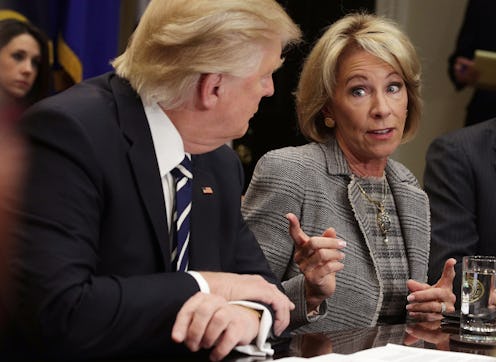News
Trump's Legacy Could Be An Education Disaster

Congressional Republicans' battle to repeal the Affordable Care Act (ACA) has received the lion's share of attention — or at least the attention devoted to legislation (as opposed to wire-tapping allegations and suggestions of microwave spying). As important as that debate is, however, there's another item on the Republican agenda that could have consequences every bit as harmful as an ACA repeal. House bill 610 (H.R. 610) would, among other things, establish a voucher program for American schools, funded by a repeal of the Elementary and Secondary Education Act of 1965 (ESEA).
The bill was introduced by Iowa Republican Steve King, a congressman who also made headlines this week for his comments about diversity in the United States. "We can't restore our civilization with somebody else's babies," King wrote in a tweet supporting a far-right Dutch political candidate. Critics argued that the tweet reflected bigoted and even white nationalist principles, and former Klu Klux Klan grand wizard David Duke praised King in an all-caps Tweet shortly afterward.
King's personal controversies aside, H.R. 610 should be as widely discussed as an ACA repeal. Its ramifications could certainly be as widespread as undoing Obamacare without a sufficient replacement, and I believe damage done by failing to educate a generation of American children could injure the United States for decades to come.
Donald Trump has made it clear that he supports voucher programs for schools — it was a major point made in his February address to Congress, and his pick for Secretary of Education, Betsy DeVos, is a well-known advocate for voucher programs. But what, exactly, are voucher programs, and what would their implementation mean for American families?
The money the state would have spent on a given child in public school would instead go to a school selected by that child's parents, including private or religious schools. Voucher proponents like the American Federation for Children argue that this program would enable all parents, including low-income ones, to send their children to the school of their choice.
More choices does not necessarily mean better choices, however, as critics of the voucher program argue. DeVos was a well-known advocate for a charter schools program in Detroit to increase choice options; after the program was implemented, Stephen Henderson at the Detroit Free Press noted that actual quality education "remains in short supply." Moreover, in the 14 states have already implemented voucher programs, results are mixed at best. A series of recent studies intended to examine the effects of these programs each found what the New York Times called called "dismal" results — according to the Times, vouchers actively "hurt student learning." A voucher program, furthermore, wouldn't come cheaply: Trump's school choice proposal would cost upwards of $20 billion.
That money would come out of existing federal education funds allocated under the Elementary and Secondary Education Act of 1965 (ESEA). ESEA was signed into law by President Lyndon B. Johnson and particularly sought to help underprivileged children by providing grants to school districts and state education agencies. It also provides particular funds to help educate low-income students and children with disabilities.
H.R. 610 would repeal ESEA and use this money to fund vouchers and block grants, instead. The loss of federal ESEA aid means that the many schools that rely on its grants would not have sufficient funding. According to the United Federation of Teachers (UFT), an ESEA repeal and voucher program would increase class sizes, decrease the teacher-student ratio, and cause the loss of after-school programs.
"The damage would spread through the system," UFT President Michael Mulgrew said in February, "raising class sizes even in non-Title I schools, threatening academic enrichment programs, guidance, art and music and other services our children depend on.”
The ostensible aim of voucher programs — to enable all children in America to get a good education — is an admirable one.
However, given the lack of compelling evidence that such programs work, and given the immense value of existing ESEA federal grants to schools across the country, I believe H.R. 610 would be a disaster for American students.